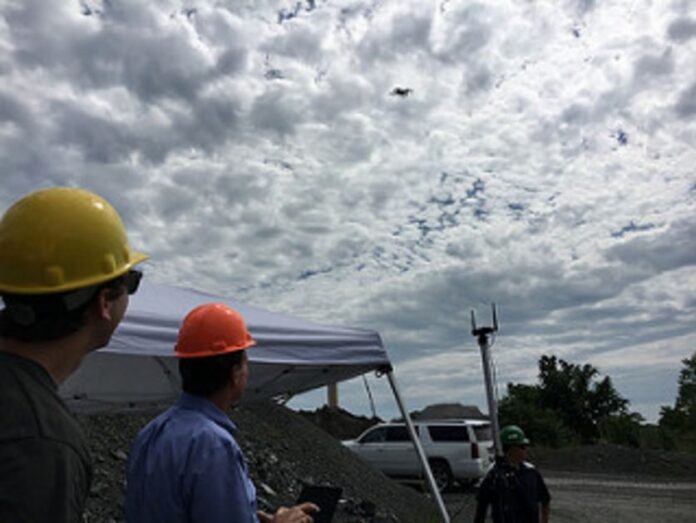
U.S. Senator Mark Warner, D-Virginia, believes unmanned systems such as drones will one day be as popular as cell phones.
“I got in the cell phone business in the early ‘80s and people underestimated the amount of use it would have,” he said. “People thought it would take 30 years to build a wireless system, and that the end of that about 3 percent of Americans would have cell phones. They were wrong and I did pretty well. I feel like this is the same kind of potential.”
Warner, an early investor in cell phone technology, visited Culpeper on a sweltering Friday morning for a drone demonstration at the Cedar Mountain Quarry. He watched while drones hovered above a 50-acre pit as explosives blasted away a large chunk of granite.
“We use drones for about every other blast to understand if we’re using the right amount of explosives,” said Cedar Mountain Stone owner Ed Dalrymple.” We can tell that by looking down it.”
Before the recent advent of drones, the quarry gauged its use of explosives by eye.
“We stood back and watched it and said, ‘Hey, this looks pretty good,’” Dalrymple said. “This way, we get to see the physical effect.”
Cedar Mountain Stone continues to partner with Germanna Community College on its drone training programs for commercial applications, an initiative the college hopes to grow, according to Germanna President David Sam, in attendance at the recent outdoor demonstration.
He said 42 students had completed drone classes since they launched last fall and another half-dozen or so are enrolled right now.
“We’re looking to expand training in the kind of things they can do — surveying, construction inspections, agricultural,” Sam said.
Ben Sherman oversees the drone program at Germanna in partnership with the Washington, D.C. office of senseFly, a Swiss company that develops and produces the unmanned aerial vehicles. Brandy Station-based Stilwell Technologies, a robotics company, is another Germanna contractor.
Agricultural uses for drones could include doing a pink eye inspection measuring infrared heat on the eyes of a herd of cattle using a land-based rover, Sherman said, something Wayne Stilwell said comes in very handy.
“My dad has owned a plumbing company in Culpeper for 40 years and is still running 200 head of cattle at 70-years-old, and he’s very worn out,” said the Army veteran who owns Stillwell Technologies. “That’s why we started it because we always have so many pink eye problems and it takes a lot of work once you get pink eye in your herd.”
Drone use is quicker, easier and cheaper than manual methods, Sherman said, noting that senseFly on Thursday mapped the entire 150-acre quarry in about an hour. A drone was also recently used to inspect the new bridge going in at U.S. 29 and Route 666, he said.
Adam Zylka with senseFly said opportunities abound.
“Today we are going to look at some of the thermal imaging, some of the thermal properties of the blast site since the quarry is kind of interested in that,” he said. “We can take the images to compare the blast site from yesterday and today.”
Drones can additionally be used for surveying on construction projects, said Briton Voorhees with senseFly.
“The amount of time you can save on that is pretty staggering,” he said. “Covering a natural area and you wanted a topography survey of it could take guys a week or two to do a couple hundred acres and now they can do that in an hour with a drone.”
Senator Warner, who co-founded Nextel, said the potential for unmanned systems is nearly limitless.
“I’ve been meeting with Google and they’re talking about having a drone that could deliver a meal to you within a six-mile radius within 15 minutes for a few dollar charge. They’re testing that technology now so this is coming and what my hope is that Virginia can be one of the leaders,” he said.
Warner said Germanna was among the community colleges nationwide at the forefront of drone education.
“We’ve got to constantly worry about safety concerns, cyber security, hacking, but that doesn’t’ mean we don’t need to keep testing, keep pushing ahead,” he said.
Following the drone demonstration, Warner addressed American security in the wake of the recent large-scale terrorist attack at a Bastille Day celebration in Nice, France.
“What the terrorists want is for us to be afraid. They want us to restrict our lifestyles, restrict our freedoms and we have to be vigilant, but I don’t believe people should be changing their plans,” he said.
Warner, a member of the senate intelligence committee, had not yet received a briefing on the attack with a truck that killed at least 84 people at last count.
“Was this a lone wolf? Was this part of a broader plot? To me, it means we’ve got to combat these terrorists both domestically, internationally. We’ve got to take more of the fight to their so-called caliphate in Syria and Iraq,” said the senator. “One of my fears is that a lot of this will require information sharing. We saw in the case of Brussels, some of the perpetrators were on lists, but that information didn’t get fully shared. We don’t know enough what happened in Nice yet to make any of those judgments, but the scenes were pretty horrific.”


